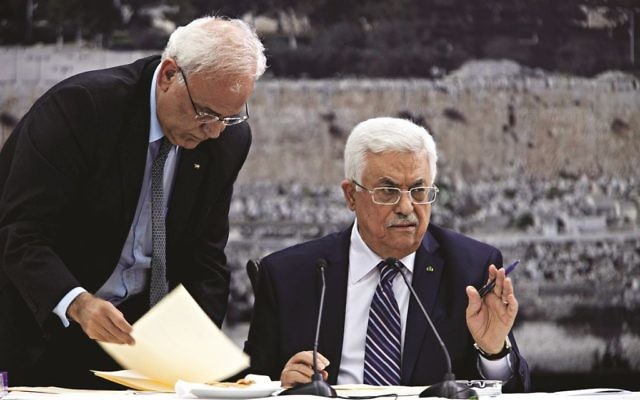Mahmoud Abbas discharged from hospital after week-long stay
Palestinian president leaves care amid more speculation about his long history of health problems
Palestinian President Mahmoud Abbas has been discharged from a West Bank hospital, ending a week-long stay that drew new attention to the 83-year-old’s long history of health problems and his refusal to name a deputy or successor.
Wearing a dark suit and speaking in a steady voice, he said he would quickly return to work and thanked supporters around the world for checking in on him while he was in the hospital.
“Thank God I’m discharged from the hospital today in full health, and will return back to work from tomorrow,” Mr Abbas said.
But he hinted that the heavy work load and stress of the US recognition of Jerusalem as Israel’s capital had affected his health.
“If the Jerusalem issue put me in the hospital, I want to leave while Jerusalem is our capital,” he told reporters in a brief statement.
The Palestinians strongly objected to the US decision on Jerusalem, and the subsequent move of the American Embassy from Tel Aviv to Jerusalem this month.
The Palestinians believe the US move undercuts their claim to Israeli-annexed east Jerusalem as the capital of a future state, and Mr Abbas has since frozen ties with the Americans.
The United States has denied prejudicing the final status of Jerusalem, but the standoff with the Palestinians has complicated US plans to unveil a proposal for peace in the Middle East.
US officials have not said when the plan will be unveiled.
Mr Abbas was taken to hospital last weekend with a fever, just days after undergoing ear surgery.
Palestinian officials said he had pneumonia and was on a respirator, receiving antibiotics intravenously.
His allies insisted he was in good health, but day after day he remained in hospital, and on Sunday, plans to release him were abruptly pushed back.
Mr Abbas, a longtime smoker with weight problems, has a long history of health issues, ranging from heart trouble to a bout with prostate cancer a decade ago.
Two years ago, he underwent an emergency heart procedure after suffering exhaustion and chest pains.
More recently, a cardiologist moved into the presidential compound in Ramallah to monitor the longtime leader after a mysterious hospital visit in the US.
That visit followed Mr Abbas’ address to the UN Security Council, in which he appeared weak.
The series of health scares have revived anxiety over a potential or even bloody succession battle.
After more than a decade of avoiding discussion of the post-Abbas era, Palestinian officials have cautiously begun to breach the matter in the open, mostly by playing down the crisis, even while potential successors are quietly jockeying for position.
“Some are using the president’s illness for political gain. Shame on them,” said Jibril Rajoub, a former security chief who is considered to be one of the would-be successors.
Abbas Zaki, a top official in Mr Abbas’ ruling Fatah party, dodged the question of succession, saying the Palestine Liberation Organisation, an umbrella governing body, “will be in charge if the president’s post is empty”.
Mr Abbas took over as a caretaker leader following the death of Palestinian leader Yasser Arafat in 2004, and was elected for what was supposed to be a five-year term the following year.
A political split with Hamas – the Palestinian militant group that seized the Gaza Strip in 2007 – has prevented new elections.
He has remained in office as president of the internationally recognised Palestinian Authority since then, governing parts of the West Bank.

Thank you for helping to make Jewish News the leading source of news and opinion for the UK Jewish community. Today we're asking for your invaluable help to continue putting our community first in everything we do.
For as little as £5 a month you can help sustain the vital work we do in celebrating and standing up for Jewish life in Britain.
Jewish News holds our community together and keeps us connected. Like a synagogue, it’s where people turn to feel part of something bigger. It also proudly shows the rest of Britain the vibrancy and rich culture of modern Jewish life.
You can make a quick and easy one-off or monthly contribution of £5, £10, £20 or any other sum you’re comfortable with.
100% of your donation will help us continue celebrating our community, in all its dynamic diversity...
Engaging
Being a community platform means so much more than producing a newspaper and website. One of our proudest roles is media partnering with our invaluable charities to amplify the outstanding work they do to help us all.
Celebrating
There’s no shortage of oys in the world but Jewish News takes every opportunity to celebrate the joys too, through projects like Night of Heroes, 40 Under 40 and other compelling countdowns that make the community kvell with pride.
Pioneering
In the first collaboration between media outlets from different faiths, Jewish News worked with British Muslim TV and Church Times to produce a list of young activists leading the way on interfaith understanding.
Campaigning
Royal Mail issued a stamp honouring Holocaust hero Sir Nicholas Winton after a Jewish News campaign attracted more than 100,000 backers. Jewish Newsalso produces special editions of the paper highlighting pressing issues including mental health and Holocaust remembrance.
Easy access
In an age when news is readily accessible, Jewish News provides high-quality content free online and offline, removing any financial barriers to connecting people.
Voice of our community to wider society
The Jewish News team regularly appears on TV, radio and on the pages of the national press to comment on stories about the Jewish community. Easy access to the paper on the streets of London also means Jewish News provides an invaluable window into the community for the country at large.
We hope you agree all this is worth preserving.






















